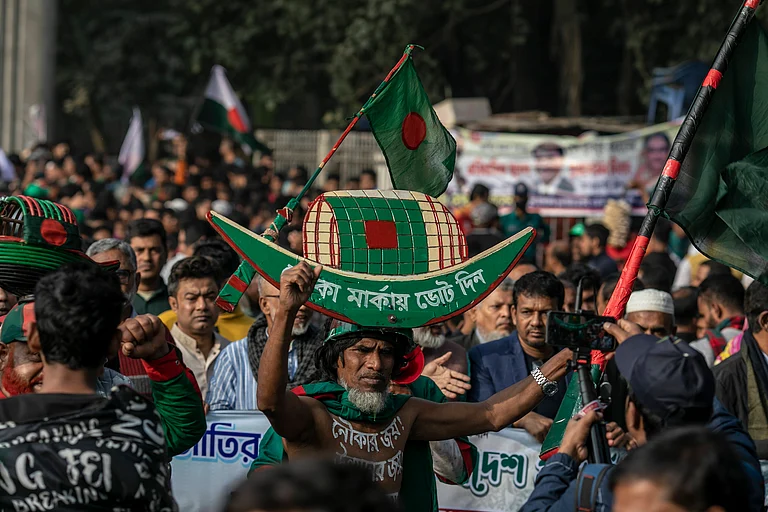The Kukis of Manipur, an ethnic group that inhabits the hills of the northeastern state, have been in a constant battle to prove their history and origin.
Since the start of ethnic clashes in the first week of May between the tribal Kuki group and the dominant Meitei community in Manipur, the northeastern state of India which shares a border with Myanmar, has become a hotbed of contested claims. The Kukis, who belong to the Kuki-Mizo-Chin group of peoples spread across India, Burma and other parts of China, live in the hills of Manipur along with the Nagas and the three dominant major population groups have been coexisting in Manipur, as records show, since pre-colonial times.
However, since the start of the ongoing conflict, triggered by the Meitei demand for inclusion in the “Schedule Tribe” category and foregrounded by a history of majoritarianism and cultural hegemony against Kukis, questions have now come up about the origin of Kukis, who are being painted as “outsiders” by some sections. Amid allegations that large sections of the current Kuki population of Manipur are “illegal” foreigners from Myanmar’s Chin state, certain sections of Meitei persons and organisations like the Federation of Haomee are questioning well-documented parts of Kuki history like the Anglo-Kuki War of 1917-1919, a canon event in Kuki history which highlights their contribution to India’s freedom struggle and the fight against its colonial overlords.
Earlier in August, the group which consists of Meiteis residing across parts of the valley region, lodged an FIR with Manipur Police against the authors of a book highlighting the Anglo-Kuki War of 1917-19, written by retired Colonel Vijay Chenchi. The FIR comes amid a wider and concerted effort to portray Kukis as "aggressive" interlopers with even Naga groups questioning the validity of the Kuki claims.
Kuki scholar and Associate Professor at the Centre for Social Sciences in Delhi's Jawaharlal Nehru University, Thongkholal Haokip, one of the accused in the FIR, speaks to Outlook on how the FIR and the allegations it contains against Kukis are baseless and part of a larger pattern to discredit the history of the Kuki people through selective remembrance of things that happened in the past.
Recently, an FIR was filed against you and the author/coeditor of the book “The Anglo-Kuki War 1917-1919: A Frontier Uprising Against Imperialism During the First World War”? What is your take on the incident, why do you think it was filed now?
The book is purely an academic exercise to commemorate the centenary of the Kuki uprising against British colonial rule. As editors, we sent out a 'call for papers' in November 2016 and edited the papers that were sent to us. The book was already published five years ago and was released simultaneously in Delhi and Manipur on 17 October 2018 by Shri Jairam Ramesh and Shri L. Jayantakumar Singh, Minister of Health & Family Welfare, Arts & Culture, Government of Manipur.
Such objections against the Anglo-Kuki War had nevertheless started to surface in October 2019 when the three-year centenary celebration of the Anglo-Kuki War (1917-1919) took place in the Sail division of Kangpokpi subdistrict in Manipur. Several neighbouring tribes raised objections about how this war of resistance should be remembered. Despite being a well-documented incident in history, even the existence of the Anglo-Kuki war is now being questioned. Or passed off as a “rebellion” which falls into the trap of using colonial terminology.
Is there an attempt to discredit Kuki history and academia (thus, in extension, academics) in the wake of the crisis in Manipur?
The filing FIR may have malicious intention but this cannot discredit Kuki history and academicians as the work is grounded on colonial archival materials both in India and the UK.
Do you think Kuki academics across the country who are speaking out against the atrocities and anti-Kuki narratives are being targeted?
During this conflict between the Meiteis and Kukis which became increasingly violent following May 3, many are speaking and writing on the ongoing issues. However, it is true that Kuki academicians are being unfairly targeted using legal instruments of majoritarian state power.
The FIR filed by the Meitei group Federation of Haomee alleges that the Kuki uprising killed a lot of Nagas and Koms in the hills and Muslims in the valley. To what extent is this true or a misrepresentation of what really happened?
There has been a selective historical representation of the violence that took place at the time. During the war/uprising, there were incidents of violence between rebel groups and neighbouring villages, but the circumstances leading to such incidents need to be understood.
After deciding to stand against the British, many rebel Kuki leaders toured the neighbouring hills to request the village chiefs and neighbouring tribes such as Nagas for a joint struggle against the colonisers. But sometimes, their absence was taken advantage of by other competing villages that chose the opportunity to raid the chief-less Kuki village.
An incident like this was recorded by Governor of British Assam (1937-41) Robert Reid in his notes when a Kabui village raided a Kuki hamlet to settle an old score with the village chief Tintong of Laijang, who at the time was away seeking alliance from Nagas. In return, the Kuki chief raided Kabui villages and at least 76 heads rolled as a consequence.
Records in the Assam State Archive also reveal similar incidents when the villages raided each other without so much care for ethnic affiliation. After there destruction go a Kuki village called Natjang in 1918, Kukis torched four villages as vengeance — these villages included mixed populations of Koms, Kabuis as well and Kukis which goes on to show that the warfare was more on the basis of village rivalry than clan or ethnic rivalry.
It must also be remembered that many neighbouring tribes were used by the British against the Kukis to quell the uprising.
Can you give me a little insight into how the Kukis became part of Manipur — Moreover, why does it matter, how long ago the Kukis came or from where? Is that really an important question? What decides the validity of citizenship?
Southern Manipur is largely a cultural space of the larger Chin-Kuki-Mizo people. When the Manipur kingdom came under British rule after the defeat of the Burmese it took years to demarcate the boundary, and part of this cultural space became a part of Manipur. Buddhist literature written by Lama Taranatha during the 15th century already has accounts of Kukis in their present habitat. There is no question of their citizenship.


























